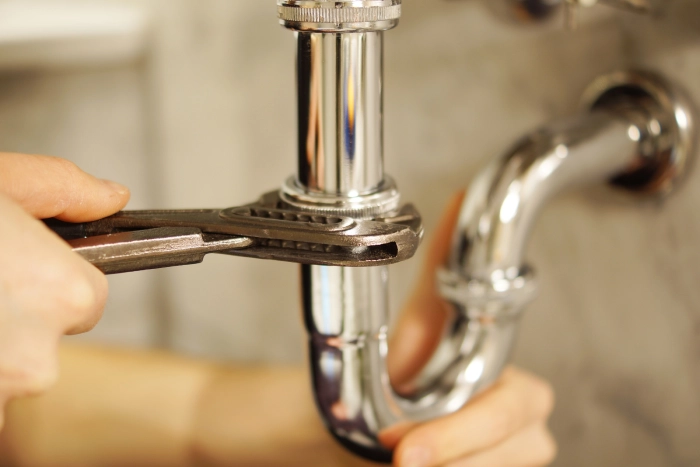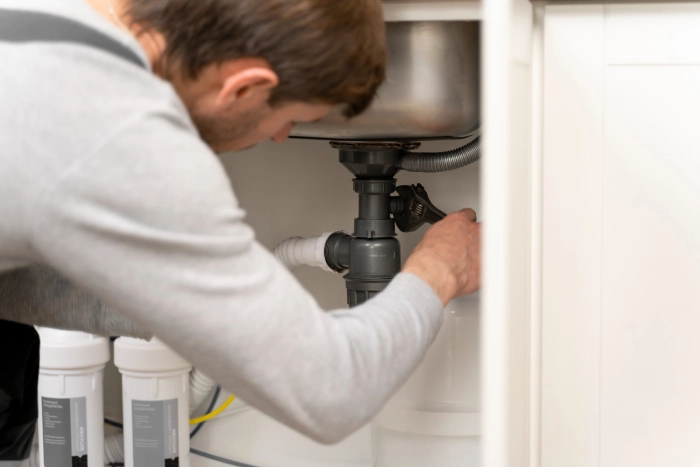
Water leakage can lead to house damage, mold growth, and costly water bills. Unfortunately, you might not always be aware that a leak has occurred in your home because the majority of the plumbing system is hidden. A small water leak can grow into a significant issue. The Environmental Protection Agency estimates that a typical home water leak can lose about 10,000 gallons of water annually.
Knowing the typical signs that lead to water leaks and keeping an eye out for them is one of the best strategies to safeguard your house from damage and inconvenience. This article discusses the common causes of water leakages and how to fix them.
What Is Considered a Water Leakage?
Water leakage happens when the flow of water from a plumbing system, appliance, fixture, or infrastructure is damaged. It can occur due to various reasons, such as pipe corrosion, faulty plumbing connections, damaged seals, or appliance malfunctions. It’s essential to promptly identify and repair water leaks to prevent further damage and conserve water resources.
Here are some common examples of water leakage:
- Dripping faucets or taps.
- Leaking pipes, either visible or hidden within walls or floors.
- Water seepage through cracks in walls, floors, or foundations.
- Leaking water heaters, dishwashers, washing machines, or other household appliances.
- Roof leaks allow water to penetrate into the building structure.
- Underground pipe leaks in irrigation systems or municipal water supply lines.
- Leaking swimming pool or spa plumbing.
7 Common Causes of Water Leakage and Their Fixes
Regular maintenance and prompt repairs are essential for preventing and addressing water leakage issues effectively. If you’re unsure about the cause of a leak or how to fix it, consider consulting a professional plumber or contractor for assistance.
Here are common causes of water leakage and their fixes:
- Faulty Seals — Leaky seals around fixtures such as faucets, showerheads, and valves can cause water to seep out. Over time, seals degrade due to wear and tear. Replace the worn-out seals with new ones. This typically involves disassembling the fixture, removing the old seal, and installing a new one.
- Leaking Pipes — Cracked or corroded pipes are a frequent cause of water leakage. This issue can occur in both visible and concealed pipes. Identify the leaking pipe and replace the damaged section. For concealed pipes, you may need to hire a professional plumber to locate and repair the leak.
- Clogged Drains — Blocked drains can cause water to back up and overflow, leading to leaks around sinks, showers, and tubs. Use a plunger or drain snake to clear the clog. Regular maintenance with drain cleaners or enzymatic cleaners can prevent clogs from forming.
- Roof Damage — Damaged or missing roof shingles, flashing, or seals can allow water to penetrate into the attic or interior spaces, causing leaks. Inspect the roof regularly for signs of damage and repair any missing or damaged components promptly. Consider hiring a professional roofer for extensive repairs.
- Cracked Foundations — Foundation cracks can allow groundwater to seep into basements or crawl spaces, resulting in water leakage. Seal foundation cracks with epoxy injections or hydraulic cement. Address any drainage issues around the foundation to divert water away from the structure.
- Appliance Malfunctions — Malfunctioning appliances such as washing machines, dishwashers, and water heaters can develop leaks over time, especially if hoses or seals degrade. Inspect appliances regularly for signs of leaks and replace worn-out hoses, gaskets, or seals as needed. Consider installing leak detection devices for early detection of leaks.
- High Water Pressure — Excessive water pressure can strain plumbing fixtures and pipes, leading to leaks and bursts. Install a pressure regulator to maintain optimal water pressure throughout the plumbing system. Additionally, inspect and replace any damaged or deteriorated plumbing components affected by high pressure.

Water Leakage FAQs
How can I tell if I have a water leak?
Signs of water leaks include unexplained increases in water bills, damp or discolored spots on walls or ceilings, musty odors, and sounds of running water when no fixtures are in use. If you suspect a leak, you can also perform a simple meter test by turning off all water sources and checking if the meter reading changes over a few hours.
What should I do if I discover a water leak in my home?
If you detect a water leak, it’s essential to act quickly to prevent further damage. Turn off the water supply to the affected area, if possible, and clean up any standing water to prevent mold and structural damage. Then, assess the extent of the damage and consider contacting a plumber or water damage restoration professional for assistance.
Can I fix a water leak myself, or do I need to hire a professional?
The complexity of repairing a water leak depends on its cause and severity. Some minor leaks, such as a dripping faucet or a loose pipe fitting, can often be addressed by homeowners with basic plumbing skills and tools. However, more extensive leaks, such as those involving damaged pipes or appliances, may require the expertise of a licensed plumber or contractor to ensure proper repairs and prevent further damage.
Are water leaks covered by homeowners insurance?
Whether water leaks are covered by homeowners insurance depends on the cause of the leak and the terms of your policy. Typically, sudden and accidental water damage, such as a burst pipe or an appliance malfunction, is covered by standard homeowners insurance. However, gradual leaks or damage resulting from lack of maintenance or neglect may not be covered. It’s essential to review your policy and contact your insurance provider for clarification on coverage for water-related issues.
Conclusion
If you notice changes in water flow, increased water bills, or other telltale signs of water leaks, it’s important to address them as soon as possible. True Plumbing’s professionals inspect any water leak in your home. We can assist with anything from kitchens to showers and water heaters. Our team can meet your demands effectively and to a higher standard. Contact us today.
